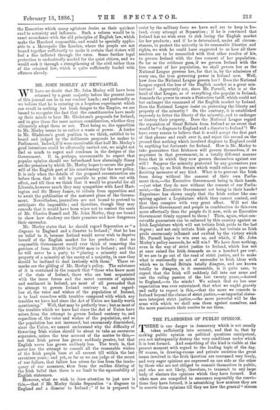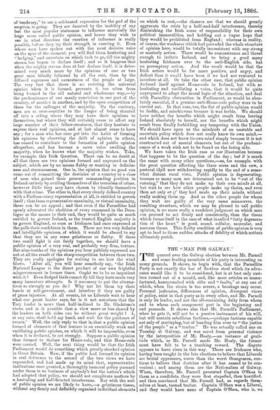THE FLABBINESS OF PUBLIC OPINION.
THERE is one danger in democracy which is not usually taken sufficiently into account, and that is, that by making public opinion on political questions omnipotent, you not unfrequently destroy the very conditions under which it is best formed. And something of the kind is visible at the present moment with regard to the leading topic of the day. Of course, in drawing-rooms and private societies the great issues involved in the Irish Question are canvassed very freely, and very eager opinions are expressed on one side or the other by those who are not obliged to commit themselves in public, and who are not likely, therefore, to transmit to any large body of electors the opinions which they have formed. But when men are compelled to announce responsibly the convic- tions they have formed, it is astonishing how anxious they are to reserve those opinions till they see how the general" stream of tendeecy," to use a celebrated expression for the god of the seeptics, is going. They are daunted by the inability of any but the most popular statesman to influence materially the huge mass called public opinion, and hence they wish to see in what direction the exertion of influence is really possible, before they try their strength in exerting it. Even where men have spoken out with the most decisive voice on the spur of the moment, you will find them hesitating and "hedging," and uncertain on which tack to go, till the mighty stream has begun to declare itself ; and so it happens that when the mighty stream does at last declare itself, it is deter- mined very much more by the opinions of one or two great men blindly followed by all the rest, than by the diffused eagerness and earnestness of the people at large. The very fact that there is no resisting the universal opinion when it is formed, prevents it too often from being formed in the old natural and wholesome way,—by the predominance of one manly conviction in one part of the country, of another in another, and by the open competition of these for the suffrages of the majority. On the contrary, men are so over-sensitive to the danger of being shunted off into a siding where they may have their opinions to themselves, but where they will certainly cease to affect any large number of their fellow-ereatures, that they hesitate to express their real opinions, and at last almost cease to have any ; for a man who has once got into the habit of forming his opinions by observing the drift of opinion in others, has ceased to contribute to the formation of public opinion altogether, and has become a mere voice swelling the majority, when he knows what the majority wishes. Take, for example, this Irish Question. There can be no doubt at all that there are two opinions formed and expressed on the subject, which are by no means flabby or wanting in definite- ness and strenuousness. One is, the opinion that no good can come out of committing the destinies of a country to a class of men who gained their present commanding position in Ireland entirely by availing themselves of the terrorism of crime, however little they may have chosen to identify themselves with that crime. The other is, that every clearly defined country with a Parliamentary representation at all, is entitled to govern itself ; that from representative unanimity, or virtual unanimity, there can be no appeal ; and that even if the Parnellites had openly advocated the abolition of every command in the Deca- logue as the means to their end, they would be quite as much entitled to govern Ireland, as the trusted English majority is to govern England, so soon as Irishmen had once expressed at the polls their confidence in them. These are two very definite and intelligible opinions, of which it would be absurd to say that they are in any sense gelatinous or flabby. If these two could fight it out fairly together, we should have a public opinion of a very real, and probably very firm, texture. But nine-tenths of the opinions you hear publicly expressed are not at all the result of the sharp competition between these two. They are really apologies for waiting to see how the wind blows. ' After all,' you will hear somebody say, 'the Irish National League is the direct product of our own frightful misgovernment in former times. Ought we to be so impatient with it Even fledged birds cannot fly till they have made very many immature attempts. Is it necessary to put the alterna- tives so strongly as you do ? Why not let them try their hands at self-government, and interfere if they are guilty of gross injustice. At all events, let us Liberals wait to hear what our great leader says, for is it not notorious that the Tory leader is more than half-inclined to Mr. Gladstone's views, and is it possible that a view more or less shared by the leaders on both sides can be without great weight ? I, at any rate, shall hold my hand, and wait for the guidance of events.' Well, the only reply to that is, that a public opinion formed of elements of that texture is an essentially weak and vacillating public opinion, on which it will be impossible, even when it is declared, to act strongly. Suppose a public opinion thus formed to declare for Home-rule, and that Home-rule were carried. Well, the next thing would be that the Irish Parliament would do something which greatly shocked opinion in Great Britain. Now, if the public had formed its opinion in real deference to the second of the two views we have expounded, and had made up its mind that, representative institutions once granted, a thoroughly immoral policy pursued under them is no business of anybody's but the nation's which had adopted that policy, we should not complicate matters by a hesitating and half-hearted interference. But with the sort of public opinion we are likely to have —a gelatinous tissue, without any firmly and definitely organised individual elements
on which to rest,—the chances are that we should greatly aggravate the crisis by a half-and-half interference, thereby diminishing the Irish sense of responsibility for their own political immoralities, and holding out a vague hope that they would be prohibited from England ; whereas in reality, of course, the weakness which had pervaded the whole structure of opinion here, would be totally inconsistent with any strong or masterly action. There would be remonstrance and threat enough to irritate Ireland, and to bring a good many hesitating Irishmen over to the anti-English side, but no peremptory action. And the result would be that the Irish action would be far more positive, and angry, and defiant than it would have been if we had not ventured to interfere at all. Or take the other case, that public opinion declared itself against Home-rule in Ireland, but with so hesitating and vacillating a voice, that it would be quite unprepared to adopt the moral logic of the situation, and deal with Parnellite obstruction in Parliament, as would be abso- lutely essential, if a genuine anti-Home-rule policy were to be carried out. In that case, too, the fiat of public opinion would be feeble, and mischievous because it was feeble. We should have neither the benefits which might result from leaving Ireland absolutely to herself, nor the benefits which might result from finally forbidding any tampering with the Union. We should have upon us the mischiefs of an unstable and uncertain policy which does not really know its own mind,— and which does not know its own mind simply because it is not constructed out of mental elements, but out of the predomi- nance of a weak wish not to be found on the losing side.
We have taken the Irish case as our illustration because that happens to be the question of the day ; but it is much the same with many other questions,—as, for example, with the great question affecting the three acres and the cow, a pastoral idyll now withdrawing rapidly to the end of a some- what distant rural vista. Public opinion is degenerating, because so many men are determined not to be "out of the running," that they do not make up their own minds at all, but wait to see how other people make up theirs, and even then act only at if they had made up their minds, without really making them up. And as the other people for whom they wait are guilty of the very same manoeuvre, the resulting structure, which we may be pleased to call public opinion, is no more really a confident judgment on which men can proceed to act firmly and consistently, than the tissue which forms itself in the case of what is called "fatty degenera- tion of the heart" is good, sound, cellular, muscular, and nervous tissue. This flabby condition of public opinion is very apt to lead to those sudden attacks of debility of which nations ultimately perish.



































 Previous page
Previous page